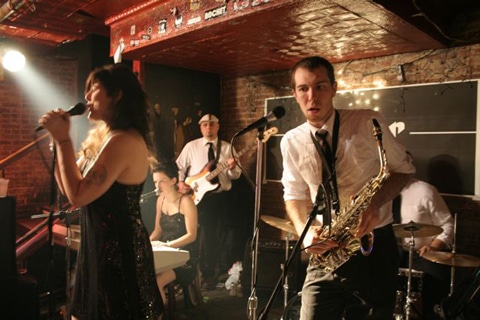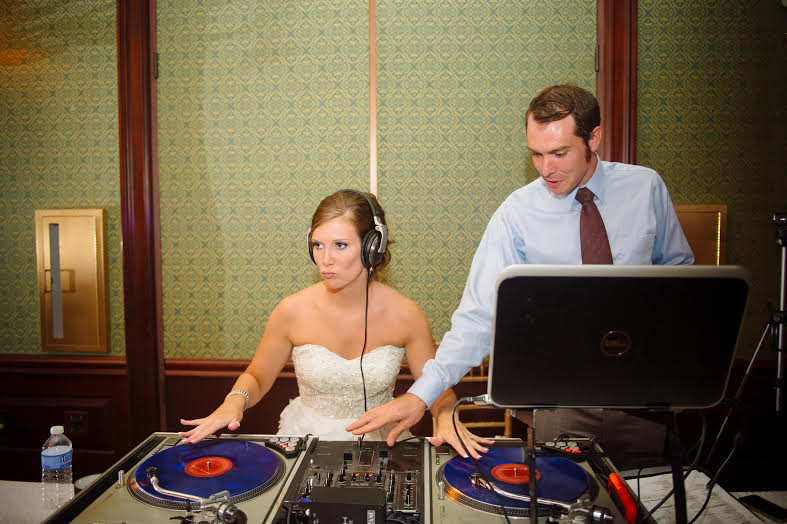
Artscape, Baltimore, MD. Photo Credit: Greg Hindman (Flickr)
Aran Keating has freed himself of punching the clock. He doesn’t sit at a desk from nine to five, or spend his daytime selling strangers on hip new software updates. Aran spends his time doing what he loves, and has spent the last decade rocking out in the pursuit of happiness. He is the Artistic Director of the Baltimore Rock Opera Society (B.R.O.S.), owns his own entertainment company, and can be seen performing with musical acts like Snakefeast, A.K. Slaughter, and the Motorettes.
Aran started his career at Goucher as an aspiring writer. He expected going in that writing would never be his bread-winning skill set, and he was partially correct. He explored music production, film-making, acting, saxophone, and spinning records. His course changed forever when he met the founding members of the Baltimore Rock Opera Society, and together, the troupe set out on a 7,000 year journey. Their mission: the creation of theatrical rock epics. He is considered to be the fearless leader of a dynamic and diverse artistic community that thrives on friendship and limitless imagination.
When he isn't organizing massive rock operas, Keating plays saxophone, spins records, and has indulged our fair city in some of the most entertaining hip hop in Baltimore. His artistic endeavors are almost entirely volunteer, so he spends his working hours as a self-employed wedding DJ. He owns a DJing service called Ridiculous Entertainment. He spends his time event-planning, spinning records, and until recently, instructing at his home-spun DJ academy. His life is anything but boring -- we could all take a page from Aran Keating's book.
HBP: Would you say that you’ve officially found your identity? Or are you still in the middle of your path somewhere?
Aran: It’s funny, I feel like I’ve only recently started to let go of the idea that I could acquire any skills that I wanted to, and that I could get good at whatever it was that I wanted to be doing. It was in the past couple of years that I started to realize that what I was spending the majority of my time doing is what I was going to be good at. That is when I was spending most of my time organizing events for B.R.O.S. I started to DJ for pleasure a lot less. I stopped producing music as much. A.K. Slaughter sort of had its golden period where we were producing a lot of music, and generating a lot of output. That started to wane.
Aran: I started to realize that you are what you spend your time doing. I’m pretty happy with what I spend my time doing, but you also

Aran Keating on sax with The Motorettes.
“You are what you spend your time doing.”
go through struggles. You ask yourself, “am I happy with what I’m doing?” And there are moments when I am definitely not happy doing what it takes to do B.R.O.S. Well, fuck it, I could just hang it all up, and go start making films somewhere. I had that thought a couple of years ago. I was at a low ebb. I made a plan for myself: I’ve got
three years. If in three years, I’m still feeling the way I feel right now, about how rewarding this is, A.K.A. not that rewarding, I’m going to make an exit plan. I’m going to start transitioning out of it. I’m going to find something for myself that is exactly the reward that I’m looking for the amount of work that I’m putting in. That didn’t happen. That moment in time, for me, has passed. I haven’t returned to that point. That is something you have to constantly re-evaluate. You have to constantly be thinking … I want go where my time is best used. Used to my maximum potential. At the end of the day, this rock opera thing is pretty fucking rewarding for me.
HBP: So what happens when you reach an even creativity:money ratio? Is that a goal? Would you eventually want to stop some of the side projects?
Aran: It’s about efficiency. Like my DJing business: I know it inside and out. It’s pretty easy for me to make people happy, and for me to please my clients. I wouldn’t stop DJing. It’s a lot of work, but it’s not a lot of brain space for me. I’m not really learning a lot, but I feel really good about the work that I do. There is a significant reward. I do worry that as I stop learning new things, that I’m going to get bored. Just like someone in an office job once they’ve got the deal of it. They say that two years is plenty of time to spend in a job these days. That you constantly want to be building new skills. That’s how fast the world works. I love wedding DJing. I’m more worried about getting bored than I am about the amount of time or brain energy it takes to keep that career going.

Ridiculous Entertainment on the job. Scratching records with the bride. Photo Credit: Marcella Treybig Photography
HBP: What is the breakdown of your brain-space? Where do you invest your energy?
Aran: 20% idea generation, 40% collaborating with other people's ideas, and 40% agonizing over what it takes to execute those ideas. Specifically agonizing. All the emails and organizational documents [as B.R.O.S.' Artistic Director]. Agonizing about not getting enough work done, because I’m not as good at the organizational stuff.
HBP: If you are what you spend your time doing, does that mean your role as Artistic Director will be evolving, or do you think you will evolve to fit the position?
Aran: I’d say both. I work really hard to try and be more efficient. I try to make myself into that organizational powerhouse as much as I am able to. That’s what it takes. You hit a certain point in your life where you ask yourself: “am I happy with how good I am at this, or do I want get better at it?”
At the point where you say: “nah, I’m good.” I mean… what’s that even mean, you know? I always want to get better at it. I can pick different skills, and develop those. I love doing that. If I’m going to make this my career, I’m going to have to get better at doing what I’m doing. I think about it all the time. Taking courses, getting a life coach or something. Buying a Fancy Hands membership. Anything that is going to make me better at what I’m doing. Anything that is going to make me happier.
HBP: Any advice for someone looking to inspire a more fulfilling career?
Aran: It’s really important to follow your impulses, to follow your interests. For anybody who has that impulse, and feels the need to go learn something on their own. That’s exactly where they need to be...even if it has nothing to do with work. If you care about being happy, then follow your impulses. Any idea that you have that separates you from someone else, that puts you into a smaller group of people. Those ideas lead to skills, and those skills will lead to
“Follow your impulses and build skills around them, even if it is strictly for pleasure, because the pleasure will turn into meaningful work.”
meaningful work for you. Follow your impulses and build skills around them, even if it is strictly for pleasure, because the pleasure will turn into meaningful work.

Aran Keating followed his impulses during the 2013 Artscape in the pouring rain. Playing saxophone with enormous "Party Hard" and "Drink Beer" banners in tow. Photo Credit: Chuck Patch (Flickr)
Work & Play is Human Being Productions' monthly column that documents career professionals who choose rewarding creative lives.

